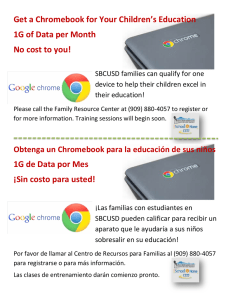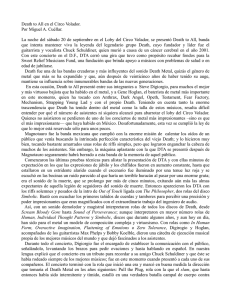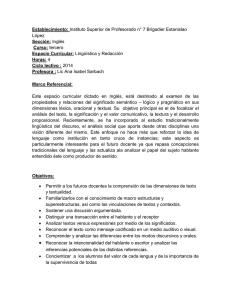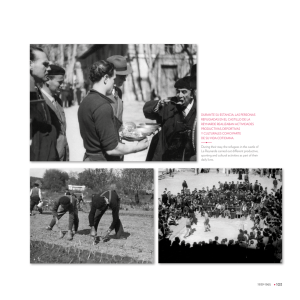HELPING STUDENTS WITH GRIEF (Elementary)
Anuncio
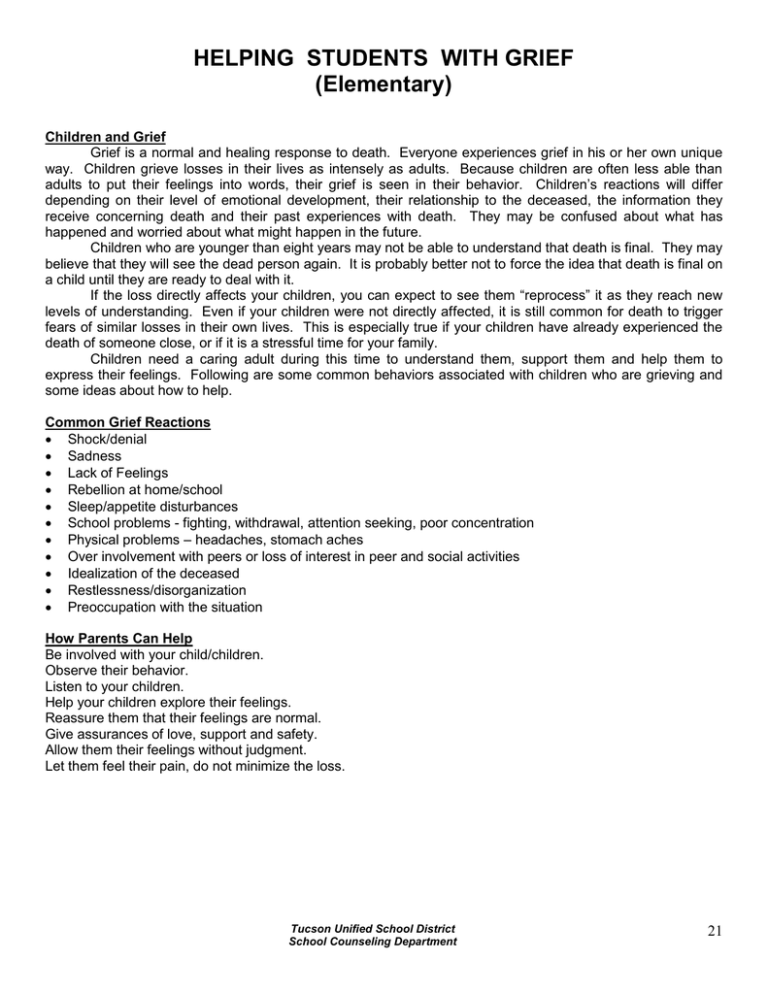
HELPING STUDENTS WITH GRIEF (Elementary) Children and Grief Grief is a normal and healing response to death. Everyone experiences grief in his or her own unique way. Children grieve losses in their lives as intensely as adults. Because children are often less able than adults to put their feelings into words, their grief is seen in their behavior. Children’s reactions will differ depending on their level of emotional development, their relationship to the deceased, the information they receive concerning death and their past experiences with death. They may be confused about what has happened and worried about what might happen in the future. Children who are younger than eight years may not be able to understand that death is final. They may believe that they will see the dead person again. It is probably better not to force the idea that death is final on a child until they are ready to deal with it. If the loss directly affects your children, you can expect to see them “reprocess” it as they reach new levels of understanding. Even if your children were not directly affected, it is still common for death to trigger fears of similar losses in their own lives. This is especially true if your children have already experienced the death of someone close, or if it is a stressful time for your family. Children need a caring adult during this time to understand them, support them and help them to express their feelings. Following are some common behaviors associated with children who are grieving and some ideas about how to help. Common Grief Reactions Shock/denial Sadness Lack of Feelings Rebellion at home/school Sleep/appetite disturbances School problems - fighting, withdrawal, attention seeking, poor concentration Physical problems – headaches, stomach aches Over involvement with peers or loss of interest in peer and social activities Idealization of the deceased Restlessness/disorganization Preoccupation with the situation How Parents Can Help Be involved with your child/children. Observe their behavior. Listen to your children. Help your children explore their feelings. Reassure them that their feelings are normal. Give assurances of love, support and safety. Allow them their feelings without judgment. Let them feel their pain, do not minimize the loss. Tucson Unified School District School Counseling Department 21 Other Ways Parents Can Help Use clear language (died, death, dead) Discuss with your children their feelings about attending the funeral. Plan for a caring adult to be present at the funeral, if your child attends. Routine and consistency are important. Be sensitive to the need for peer group support. Set reasonable limits and provide structure to provide feelings of security. Permit or encourage talk about the person who died. Get extra help if you need it. Books for Young Students Buscaglia, Leo. The Fall of Freddie the Leaf. The story of how life itself is immortal. Carlstrom, Nancy White. Blow Me a Kiss Miss Lilly. The death of an elderly friend. Clifton, Lucille. Everett Anderson’s Goodbye. A young child struggles through the stages of grief after his father’s death. Cohn, Janice. I Had a Friend Named Peter. A young child’s best friend is killed in an accident. Fassler, Joan. My Grandpa Died Today. The death of a grandfather. Gould, Deborah. Grandpa’s Slide Show. Family memories are important after the death of a grandfather. Powell, E. Sandy. Geranium Morning. A young child deals with the death of his father. Sanford, Doris. It Must Hurt A Lot. A child’s pet dog dies. Stiles, Norman. I’ll Miss You Mr. Hooper. The death of a very special Sesame Street friend. Tejima. Swan Sky. The life and death of a young swan. Wilhelm, Hans. I’ll Always Love You. A little boy’s pet dog dies. Varley, Susan. Badger’s Parting Gifts. Badger’s friends deal with his death. Books for Intermediate Students Clifford, Eth. The Remembering Box. The death of a grandmother, family love and tradition. Donnelly, Elfie. So Long, Grandpa. The approaching death of a grandfather and the relationship he shares with his grandson. Jukes, Mavis. Blackberries in the Dark. A young man'’ visit to his grandmother’s home brings back memories of his grandfather who died in the spring. Orgel, Doris. Whiskers Once and Always. A young girl'’ pet dies. Smith, Doris Buchanan. A Taste of Blackberries. The loss of a special friend. Books for Older Students Forman, James. The Big Bang. The death of an older brother. L’Engle, Madeleine. A Ring of Endless Light. The impending death of a grandfather. Naughton, Jim. My Brother Stealing Second. The death of an older brother. Ure, Jean. One Green Leaf. Teenage friends deal with the death of a friend. Books for Parents Alderman, Linda. Why Did Daddy Die? Helping children cope with the loss of a parent. Gaffney, Donna A. The Seasons of Grief. Helping children work through loss. Gravelle, Karen & Haskinsm, Charles. Teenagers Face to Face with Bereavement. Helping teenagers work through loss. Lombardo, Victor S., & Lombardo, Edith Foran. Kids Grieve Too. Rofes, Eric. The Kids Book About Death and Dying; By and for Kids. Wass, Hannelore & Corr, Charles A. Helping Children Cope with Death; Guidelines and Resources. Some of these books may be available in the school library or with the school counselor. Tucson Unified School District School Counseling Department 22 HELPING STUDENTS WITH GRIEF (Middle/High School) Children and Grief Grief is a normal and healing response to death. Everyone experiences grief in his or her own unique way. Young persons grieve losses in their lives as intensely as adults. They can experience a variety of emotions that may vary from day to day. Young people’s reactions will differ depending on their level of emotional development, their relationship to the deceased, their belief system about death and their past experiences with death. Those who are experiencing stress in their personal or family relationships may have more difficulty coping. A common characteristic of young people is the belief in their own immortality. Young people may take on an attitude of “I dare it to happen to me,” which taken to an extreme could mean experimenting with dangerous behaviors or situations. Young people have a more adult understanding of death but may not fully accept that it will happen to them. They may express a lot of anger about death because they are more comfortable expressing anger than hurt and sadness, which may seem childish to them. It is common for young people to need and seek out support from their friends during this time. This peer support is important, but they also need caring support from the adults in their lives. Even if your young person did not have a close relationship with the person who died, death can often trigger feelings from past losses. The feelings can be just as strong as any directly related to the current loss. Following are some common behaviors associated with young people who are grieving and some ideas about how to help. Common Grief Reactions Shock/denial Sadness Lack of Feelings Rebellion at home/school Sleep/appetite disturbances School problems - fighting, withdrawal, attention seeking, poor concentration Physical problems – headaches, stomach aches Over involvement with peers or loss of interest in peer and social activities Idealization of the deceased Restlessness/disorganization Preoccupation with the situation How Parents Can Help Be involved with your child/children. Observe their behavior. Listen to your children. Help your children explore their feelings. Reassure them that their feelings are normal. Give assurances of love, support and safety. Allow them their feelings without judgment. Let them feel their pain, do not minimize the loss. Tucson Unified School District School Counseling Department 23 Other Ways Parents Can Help Use clear language (died, death, dead) Discuss with your children their feelings about attending the funeral. Plan for a caring adult to be present at the funeral, if your child attends. Routine and consistency are important. Be sensitive to the need for peer group support. Set reasonable limits and provide structure to provide feelings of security. Permit or encourage talk about the person who died. Get extra help if you need it. Books for Young Students Buscaglia, Leo. The Fall of Freddie the Leaf. The story of how life itself is immortal. Carlstrom, Nancy White. Blow Me a Kiss Miss Lilly. The death of an elderly friend. Clifton, Lucille. Everett Anderson’s Goodbye. A young child struggles through the stages of grief after his father’s death. Cohn, Janice. I Had a Friend Named Peter. A young child’s best friend is killed in an accident. Fassler, Joan. My Grandpa Died Today. The death of a grandfather. Gould, Deborah. Grandpa’s Slide Show. Family memories are important after the death of a grandfather. Powell, E. Sandy. Geranium Morning. A young child deals with the death of his father. Sanford, Doris. It Must Hurt A Lot. A child’s pet dog dies. Stiles, Norman. I’ll Miss You Mr. Hooper. The death of a very special Sesame Street friend. Tejima. Swan Sky. The life and death of a young swan. Wilhelm, Hans. I’ll Always Love You. A little boy’s pet dog dies. Varley, Susan. Badger’s Parting Gifts. Badger’s friends deal with his death. Books for Intermediate Students Clifford, Eth. The Remembering Box. The death of a grandmother, family love and tradition. Donnelly, Elfie. So Long, Grandpa. The approaching death of a grandfather and the relationship he shares with his grandson. Jukes, Mavis. Blackberries in the Dark. A young man'’ visit to his grandmother’s home brings back memories of his grandfather who died in the spring. Orgel, Doris. Whiskers Once and Always. A young girl'’ pet dies. Smith, Doris Buchanan. A Taste of Blackberries. The loss of a special friend. Books for Older Students Forman, James. The Big Bang. The death of an older brother. L’Engle, Madeleine. A Ring of Endless Light. The impending death of a grandfather. Naughton, Jim. My Brother Stealing Second. The death of an older brother. Ure, Jean. One Green Leaf. Teenage friends deal with the death of a friend. Books for Parents Alderman, Linda. Why Did Daddy Die? Helping children cope with the loss of a parent. Gaffney, Donna A. The Seasons of Grief. Helping children work through loss. Gravelle, Karen & Haskinsm, Charles. Teenagers Face to Face with Bereavement. Helping teenagers work through loss. Lombardo, Victor S., & Lombardo, Edith Foran. Kids Grieve Too. Rofes, Eric. The Kids Book About Death and Dying; By and for Kids. Wass, Hannelore & Corr, Charles A. Helping Children Cope with Death; Guidelines and Resources. Some of these books may be available in the school library or with the school counselor. Tucson Unified School District School Counseling Department 24 AYUDA PARA ESTUDIANTES EN EL PESAR (Escuela Primaria) Los Niños y el Pesar El pesar es una reacción normal y sanadora a la muerte. Todos experimentan el pesar en su propia manera única. Los niños se duelen de las pérdidas en sus vidas tan intensamente como los adultos. Debido a que los niños muchas veces tienen menos habilidad que una persona adultaa para expresar sus sentimientos en palabras, el pesar se hace notar en su conducta. Las reacciones de los niños se expresarán en diferentes maneras, depen-diendo de su propio nivel de desarrollo emocional, su relación con el difunto, la información que ellos reciben acerca de la muerte y sus experiencias anteriores con la muerte. Ellos pueden estar confusos acerca de lo que ha ocurrido y preocu-pados de lo que pudiera ocurrir en el futuro. Los niños menores de ocho años posiblemente no puedan entender que la muerte es final. Ellos pueden creer que volverán a ver otra vez a la persona que murió. Probablemente sea mejor no forzar en un niño, la idea de que la muerte es final, hasta que él esté preparado para tratar con ello. Si la pérdida afecta directamente a sus hijos, ustedes pueden esperar verlos “reprocesar” la situación, al lograr ellos nuevos niveles de enten-dimiento. Aunque sus hijos no hayan sido afectados directamente, aún es común que la muerte cause temor de una pérdida similar en sus propias vidas. Esto es especialmente verdadero si sus hijos ya han experimentado la muerte de alguien cercano, o si es un tiempo de inquietud para su familia. Los niños necesitan, durante este tiempo, a un adulto que se interese en ellos y los pueda entender, apoyar, y ayudar a expresar sus sentimientos. Las siguientes son algunas conduc-tas comunes asociadas con los niños que están sufriendo de un pesar y algunas ideas acerca de cómo ayudarlos. Reacciones Comunes del Pesar Choque/denegación Tristeza Falta de Sentimientos Rebelión en casa/la escuela Disturbio en el dormir/apetito Problemas en la escuela–pleitos, apartarse de otros, buscar atención, falta de concentración Problemas físicos – dolor de cabeza, de estómago Participación excesiva con otros estudiantes o falta de interés en los estudiantes o actividades sociales. Idealización del difunto Inquietud/desorganización Preocupación acerca de la situación Cómo Pueden Los Padres Ayudar Involucrarse con su(s) hijo/hijos. Observar la conducta de ellos. Escuchar a sus hijos. Ayudar a sus hijos a explorar sus sentimientos. Reasegurarlos de que sus sentimientos son nor-males. Darles la seguridad del amor, apoyo y protección. Permitirles sus sentimientos, sin juzgar. Dejar que ellos sientan su dolor; no minimizar la pérdida. Otras Maneras en que los Padres Pueden Ayudar Usar lenguaje claro (murió, muerte, muerto(a)) Discutir con sus hijos los sentimientos de ellos acerca del asistir al funeral. Planear para que un adulto que muestre interés esté presente en el funeral, si su hijo asiste. La rutina y consistencia son importantes. Ser sensitivos a la necesidad de que haya un grupo de apoyo compuesto de otros niños. Establecer límites razonables y proveer estructura a fin de fomentar los sentimientos de seguridad. Permitir o alentar el hablar acerca de la persona que murió. Obtener ayuda adicional si la necesitan. Tucson Unified School District School Counseling Department 25 Libros para Niños Pequeños Buscaglia, Leo. The Fall of Freddie the Leaf. Un cuento de cómo la vida misma es inmortal. Carlstrom, Nancy White. Blow Me a Kiss Miss Lilly. La muerte de una amiga anciana. Clifton, Lucille. Everett Anderson’s Goodbye. Un niño pequeño lucha durante las etapas del pesar después de la muerte de su padre. Cohn, Janice. I Had a Friend Named Peter. El mejor amigo de un niño pequeño muere como resultado de un accidente. Fassler, Joan. My Grandpa Died Today. La muerte de un abuelo. Gould, Deborah. Grandpa’s Slide Show. Las memorias de la familia son importantes después de la muerte de un abuelo. Powell, E. Sandy. Geranium Morning. Un niño pequeño trata con la muerte de su padre. Sanford, Doris. It Must Hurt A Lot. Muere un perrito domesticado de un niño. Stiles, Norman. I’ll Miss You Mr. Hooper. La muerte de un amigo muy especial del programa Sesame Street. Tejima. Swan Sky. La vida y muerte de un cisne pequeño. Wilhelm, Hans. I’ll Always Love You. Muere el perrito domesticado de un niño pequeño. Varley, Susan. Badgers Parting Gifts. Los amigos de Badger tartan con su muerte. Libros para Niños de Escuela Intermedia Clifford, Eth. The Remembering Box. El cuento de La muerte de una abuela, el amor y la tradición de la familia. Donnelly, Elfie. So Long, Grandpa. El acer-camiento de la muerte de un abuelo y la relación que él comparte con su nieto. Jukes, Mavis. Blackberries in the Dark. Un joven visita el hogar de su abuela y se trae recuerdos de su abuelo quien murió en la primavera. Orgel, Doris. Whiskers Once and Always. Muere el animalito domesticado de una joven. Smith, Doris Buchanan. A Taste of Black-berries. La pérdida de un(a) amigo(a) especial. Libros para Estudiantes Mayores Forman, James. The Big Bang. La muerte de un hermano mayor. L’Engle, Madeleine. A Ring of Endless Light. La muerte inminente de un abuelo. Naughton, Jim. My Brother Stealing Second. La muerte de un hermano mayor. Ure, Jean. One Green Leaf. Unos amigos adolescents tartan con la muerte de un(a) amigo(a). Libros para Padres Alderman, Linda. Why Did Daddy Die? Ayuda para los niños, al tratar con la pérdida de un padre. Gaffney, Donna A. The Seasons of Grief. Ayuda para los niños, al tratar con la pérdida (de un ser querido). Gravelle, Karen y Haskinsm, Charles. Teenagers Face to Face With Bereavement. Ayuda para los jóvenes adolescentes que están tratando con la pérdida. Lombardo, Victor S. y Lombardo, Edith Foran. Kids Grieve Too. (Los niños también sufren del pesar.) Rofes, Eric. The Kids Book About Death and Dying; Escrito por y para niños. Wass, Hannelore y Corr, Charles A. Helping Children Cope with Death; Guidelines and Resources. (Ayuda para los niños al tratar con la muerte; Guías y Recursos.) Algunos de estos libros pueden estar disponi-bles en la biblioteca escolar o con el consejero escolar. Tucson Unified School District School Counseling Department 26 AYUDA PARA ESTUDIANTES EN EL PESAR (Escuela Intermedia/Secundaria) Los Niños y el Pesar El pesar es una reacción normal y sanadora a la muerte. Todos experimentan el pesar en su propia manera única. Los jóvenes se duelen de las pérdidas en sus vidas tan intensamente como los adultos. Ellos pueden experimentar una variedad de emociones que pueden variar día con día. Las reacciones de los jóvenes se expresarán en diferentes maneras, dependiendo de su propio nivel de desarrollo emocional, su relación con el difunto, sus creencias acerca de la muerte y sus experiencias anteriores con la muerte. Los que están experimentando estrés en sus relaciones personales o familiares pueden tener más dificul-tad al tratar con el pesar. Una característica común de los jóvenes es la creencia en su propia inmortalidad. Los jóvenes pueden tomar una actitud de “¡Esto no se atreverá a sucederme a mí!” Mas al llevar esta actitud a un extremo podría significar que los jóvenes experi-menten con conductas o situaciones peligrosas. Las personas jóvenes tienen un entendimiento más maduro de la muerte y posiblemente no acepten cabalmente que esto les pueda suceder a ellos. Puede ser que expresen mucho coraje respecto a la muerte debido a que se sientan más cómodos con expresar el enojo que el dolor y la tristeza, lo cual podría ser para ellos una niñería. Es común que los jóvenes necesiten buscar apoyo de sus amigos durante este tiempo. Este apoyo de sus compañeros es importante, pero ellos también necesitan el apoyo y esmerado interés de las per-sonas adultas que hay en sus vidas. Aunque su jovencito(a) no haya tenido una relación estrecha con la persona que murió, la muerte muchas veces puede ocasionar el surgir de senti-mientos de las pérdidas anteriores. Los sentimientos pueden ser tan fuertes como cualquier sentimiento que se relacione directa-mente con la pérdida actual. Las siguientes son algunas conductas comunes asociadas con los jóvenes que están sufriendo de un pesar y algunas ideas acerca de cómo ayudarlos. Reacciones Comunes del Pesar Choque/denegación Tristeza Falta de Sentimientos Rebelión en casa/la escuela Disturbio en el dormir/apetito Problemas en la escuela–pleitos, apartarse de otros, buscar atención, falta de concentra-ión Problemas físicos – dolor de cabeza, de estómago Participación excesiva con otros estudiantes o falta de interés en los estudiantes o actividades sociales. Idealización del difunto Inquietud/desorganización Preocupación acerca de la situación Cómo Pueden Los Padres Ayudar Involucrarse con su(s) hijo/hijos. Observar la conducta de ellos. Escuchar a sus hijos. Ayudar a sus hijos a explorar sus sentimientos. Reasegurarlos de que sus sentimientos son nor-males. Darles la seguridad del amor, apoyo y protección. Permitirles sus sentimientos, sin juzgar. Dejar que ellos sientan su dolor; no minimizar la pérdida. Tucson Unified School District School Counseling Department 27 Otras Maneras en que los Padres Pueden Ayudar Usar lenguaje claro (murió, muerte, muerto(a).) Discutir con sus hijos los sentimientos de ellos acerca del asistir al funeral. Planear para que un adulto que muestre interés esté presente en el funeral, si su hijo asiste. La rutina y consistencia son importantes. Ser sensitivos a la necesidad de que haya un grupo de apoyo compuesto de otros niños. Establecer límites razonables y proveer estructura a fin de fomentar los sentimientos de seguridad. Permitir o alentar el hablar acerca de la persona que murió. Obtener ayuda adicional si la necesitan. Libros para Niños Pequeños Buscaglia, Leo. The Fall of Freddie the Leaf. Un cuento de cómo la vida misma es inmortal. Carlstrom, Nancy White. Blow Me a Kiss Miss Lilly. La muerte de una amiga anciana. Clifton, Lucille. Everett Anderson’s Goodbye. Un niño pequeño lucha durante las etapas del pesar después de la muerte de su padre. Cohn, Janice. I Had a Friend Named Peter. El mejor amigo de un niño pequeño muere como resultado de un accidente. Fassler, Joan. My Grandpa Died Today. La muerte de un abuelo. Gould, Deborah. Grandpa’s Slide Show. Las memorias de la familia son importantes después de la muerte de un abuelo. Powell, E. Sandy. Geranium Morning. Un niño pequeño trata con la muerte de su padre. Sanford, Doris. It Must Hurt A Lot. Muere un perrito domesticado de un niño. Stiles, Norman. I’ll Miss You Mr. Hooper. La muerte de un amigo muy especial del programa Sesame Street. Tejima. Swan Sky. La vida y muerte de un cisne pequeño. Wilhelm, Hans. I’ll Always Love You. Muere el perrito domesticado de un niño pequeño. Varley, Susan. Badgers Parting Gifts. Los amigos de Badger tartan con su muerte. Libros para Niños de Escuela Intermedia Clifford, Eth. The Remembering Box. El cuento de La muerte de una abuela, el amor y la tradición de la familia. Donnelly, Elfie. So Long, Grandpa. El acer-camiento de la muerte de un abuelo y la relación que él comparte con su nieto. Jukes, Mavis. Blackberries in the Dark. Un joven visita el hogar de su abuela y se trae recuerdos de su abuelo quien murió en la primavera. Orgel, Doris. Whiskers Once and Always. Muere el animalito domesticado de una joven. Smith, Doris Buchanan. A Taste of Black-berries. La pérdida de un(a) amigo(a) especial. Libros para Estudiantes Mayores Forman, James. The Big Bang. La muerte de un hermano mayor. L’Engle, Madeleine. A Ring of Endless Light. La muerte inminente de un abuelo. Naughton, Jim. My Brother Stealing Second. La muerte de un hermano mayor. Ure, Jean. One Green Leaf. Unos amigos adolescents tartan con la muerte de un(a) amigo(a). Libros para Padres Alderman, Linda. Why Did Daddy Die? Ayuda para los niños, al tratar con la pérdida de un padre. Gaffney, Donna A. The Seasons of Grief. Ayuda para los niños, al tratar con la pérdida (de un ser querido). Gravelle, Karen y Haskinsm, Charles. Teenagers Face to Face With Bereavement. Ayuda para los jóvenes adolescentes que están tratando con la pérdida. Lombardo, Victor S. y Lombardo, Edith Foran. Kids Grieve Too. (Los niños también sufren del pesar.) Rofes, Eric. The Kids Book About Death and Dying; Escrito por y para niños. Wass, Hannelore y Corr, Charles A. Helping Children Cope with Death; Guidelines and Resources. (Ayuda para los niños al tratar con la muerte; Guías y Recursos.) Algunos de estos libros pueden estar disponi-bles en la biblioteca escolar o con el consejero escolar. Tucson Unified School District School Counseling Department 28 EJEMPLAR Aviso para Padres Fecha Estimados Padres: El propósito de esta carta es de informarles de la desafortunada muerte/accidente que está tocando a nuestra escuela (Se indican aquí los detalles.). Tenemos hoy, trabajando con nuestros maestros personal escolar, y estudiantes, a miembros del Equipo de Crisis del TUSD. El equipo también estará disponible en una reunión de padres (Se indican aquí los detalles.). Ellos contestarán preguntas y los ayudarán a ustedes, al tratar con el proceso de expresar su pesar personal y el de su hijo(a). (Se incluye aquí cualquier información adicional.) Esperamos que puedan ustedes asistir. Por favor sientan la libertad de traer a sus hijos. (Firma del/de la Director(a)) EJEMPLAR Traducción: Lydia V. García, Traductora del TUSD FILE: OTHER DEPTS\GUIDANCE-COUNSE PARENT NOTIFICATION.DOC Tucson Unified School District School Counseling Department 29
